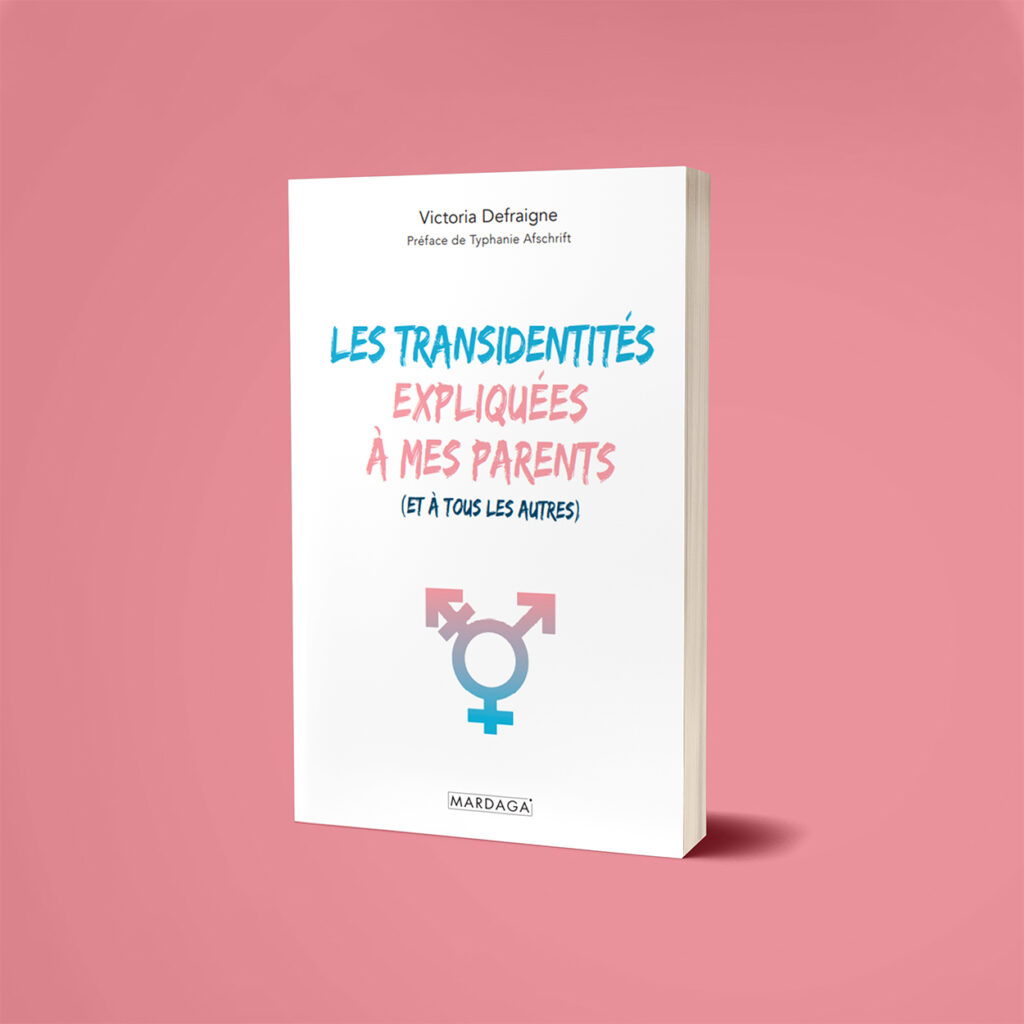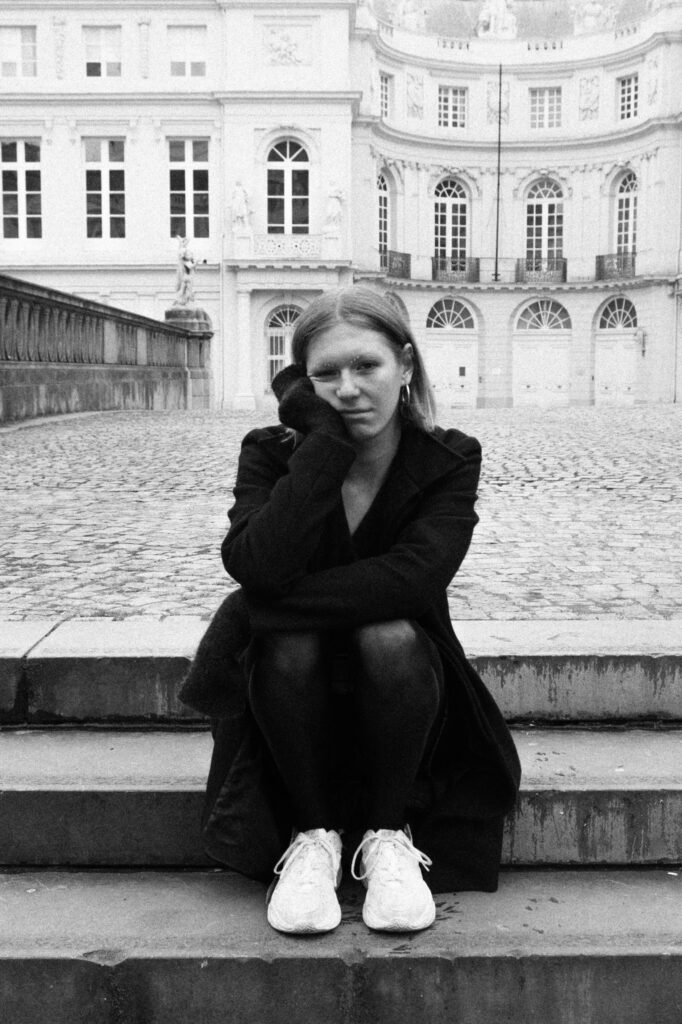To introduce the theme of trans visibility in the latest issue of KET, we decided to offer carte blanche to Victoriæ Defraigne, author of the book “Transidentities explained to my parents (and to all the others)”. Victoriæ continues to be a strong trans activist in Belgium. She has been one of the hosts of the Brussels Pride.
Visibility, a double-edged sword
As I often like to tell, I wondered for a long time why it had taken me so long to understand my transidentity. Why did it take me so many years to put into words a feeling that, once understood, seemed so obvious? It was only when I watched Disclosure, a documentary directed (among others) by Laverne Cox, that I understood: all my life, I had been fed with wrong representations of transidentities, of trans people. The transfeminine characters I had grown up with, played by cisgender men, were mocked, pointed at, and ridiculed. How could I recognize myself in an identity that no one respected? Who would want to identify with something that seemed disgusting to the media? Nobody would.
It was not until I had access to more sincere and authentic representations of trans women that I understood who I was. Learning about visibility and the experiences of other trans people helped me realise how powerful of a weapon visibility could be, for trans people themselves but also for spreading information and deconstructing the false beliefs linked to our identities.
Visibility has the power to bring people together. It is one of the roles I take on, somewhat despite myself, through my activism. I had absolutely no idea that transforming my personal Instagram account into an educational one would lead me to write a book. The initial idea behind this account was simply to regain control over what people could say about me. I had neither the weapons nor the knowledge to take on a role of activist and role model for trans people. I then learned the hard way how to get rid of all the preconceived ideas I had grown up with, how to deconstruct myself as much as possible to be as intersectional as possible, how to get rid of the negative sides of my socialisation, and, above all, how to politicise my message in the best way to make it as useful as possible. I quickly got a taste of the militant purity emanating from other trans people who, because they did not recognise themselves in my activism, considered it illegitimate. I did notice, however, that the vast majority of trans people I came in contact with thanked me for my work. Seeing a trans person visible, taking up space, and even simply existing, is very empowering for a trans person. And for cis people, it shows them that we exist and that we are no different. That is the power of visibility, in my opinion.
However, bad visibility also has the power to divide. Through misrepresentation, but also because being more visible means being more vulnerable. In the past, no one questioned our place in the public space because we were not visible, at least not as much. Today, everyone thinks they have the right to say something about us as if we were a subject for debate. We are seeing this more and more, with people like Dora Moutot, the self-proclaimed icon of the French TERF movement, leading a real war against our rights and our communities. Fortunately, this movement, deleterious to our communities, has never really succeeded in establishing itself in Belgium. However, it is at our doorstep and has spread and radicalised throughout the world.
The United States is a vivid example. On May 23, 2023, Le Monde reported that since the beginning of the year, 549 law projects going against the rights of trans people had been introduced, of which 73 had been voted. The epicentre of this American anti-trans movement is the state of Texas, where trans children and their families are being hunted down by the authorities. The Texas government has stated, based on fallacious and transphobic arguments, that transitioning is a “danger” for a child, and that a repressive policy must therefore be put into place to “protect children”, i.e. to prevent children from starting a transition if they wish so, and even worse, to force those who have already started a medical transition to detransition. As if carrying guns was not the leading cause of child mortality in the country. As a result, trans children and their families have fled the state of Texas, and healthcare professionals are forced to help families in secret, risking heavy fines – in short, a particularly dystopian yet very real situation.
On a completely different note, sport is also an environment where the visibility of our communities has led to an increase in discrimination. Although unfounded, the biological argument, also used by TERFs, is used to justify the refusal to allow transgender people to compete in the category linked to their gender identity. Even if it is easy to demonstrate that this argument is incoherent, especially when you notice that trans athletes only bother when they win and not when they lose, I understand that this may be of concern to some misinformed cis people. However, we were recently served with an incredibly wrong and absolutely incomprehensible announcement from FIDE, the International Chess Federation. A few weeks ago, it announced that, as of August 21, 2023, transgender women would be banned from women’s chess competitions, because “being born male would give them an intellectual advantage”. I can see no other explanation for this argument than misogyny. Concretely, FIDE insinuates that women are less intelligent than men. This is yet another reminder that the trans movement is eminently feminist.
Visibility is a weapon we cannot do without, even though it can lead to discrimination. I believe that if they listened to us a little more, they would understand that all we want is a little empathy. Their conservative ideologies based on an expired model prevent them from seeing beyond the (false) appearances created by the indoctrinated media. I hope they will understand that we are not going to hide anymore and that it is time to accept us, trans people. All we are asking for is a little love, and that is also what they need.



Transidentities explained to my parents (and to all the others)
How to react when a child recently comes out as trans without being clumsy and how support them? How to understand this reality as someone who is not affected by it?
Victoria Defraigne answers all the questions parents might have about transidentity. In an informative and inclusive approach, she deconstructs stereotypes and make the subject accessible to all. Because transgender people’s journeys are multiple and unique, she offers practical advice to accompany and support them with kindness, without stigmatizing them. Drawing on her experience, personal accounts, and concrete information, the author highlights the diversity of trans experiences and the fight against transphobia.
An educational book to help you understand everything about transidentities!
“Victoria Defraigne achieves to combine both teaching and sensitivity. Indeed, in addition to the general questions she answers with authenticity and pedagogy, this book reveals life, her life, the great anxieties and the small victories, the stages of a progression, one of the difficulties of which is to know the direction, or to distinguish the outcome.” Typhanie Afschrift, Preface
You may also like
-

Niall Horan, Soft-Spoken Pop Star – And Loud LGBTQ+ Ally
From Pride tweets to rainbow flags in the crowd, Irish singer Niall Horan has quietly
-

Angèle x Justice’s “What You Want”: A Queer Night Out We’ve All Dreamed Of
Projected onto the façade of La Monnaie in Brussels and shot at night in Marseille
-

Cœur de pirate at AB: the runaway pop of a queer icon lands in Brussels
A major figure in Francophone pop and an outspoken voice in the queer community, Cœur de pirate
-

When the Unseen History: [IN]VISIBLE Festival Turns KBR into an Augmented Reality Lab
From 25 to 27 March 2026, the Royal Library of Belgium (KBR) hosts [IN]VISIBLE Festival:
-

“March Is for the Queers”: Why You Should Put Queer March Ghent 2026 on Your Radar
Every March, Queer March turns Ghent into a month-long celebration of queer life, resistance, and

